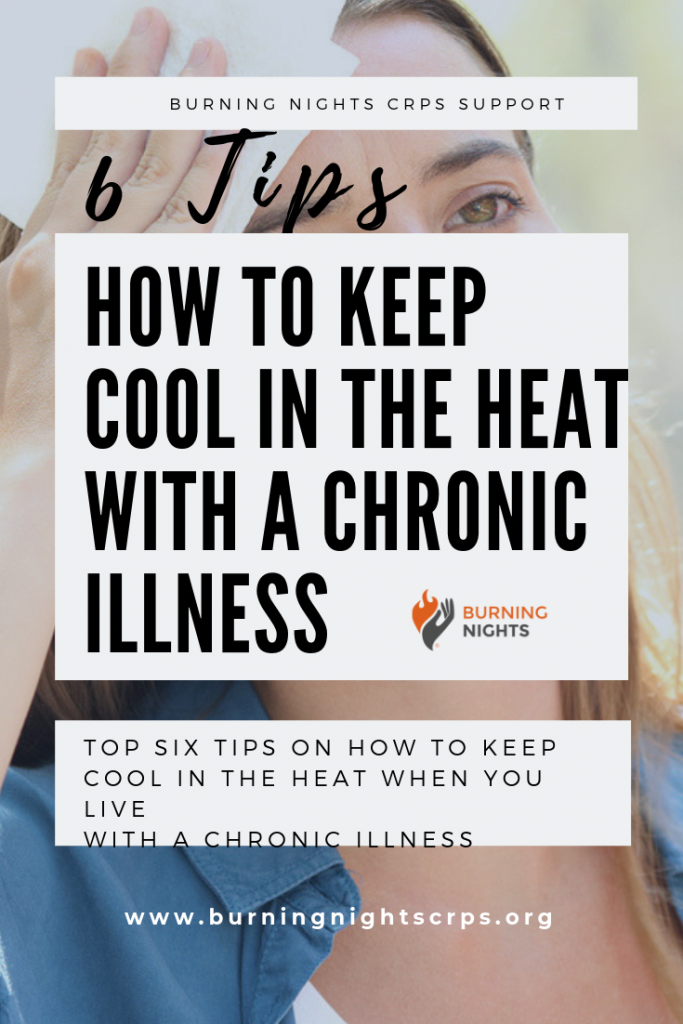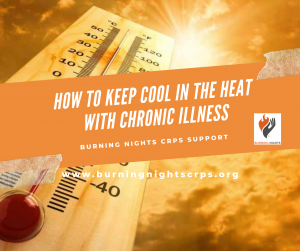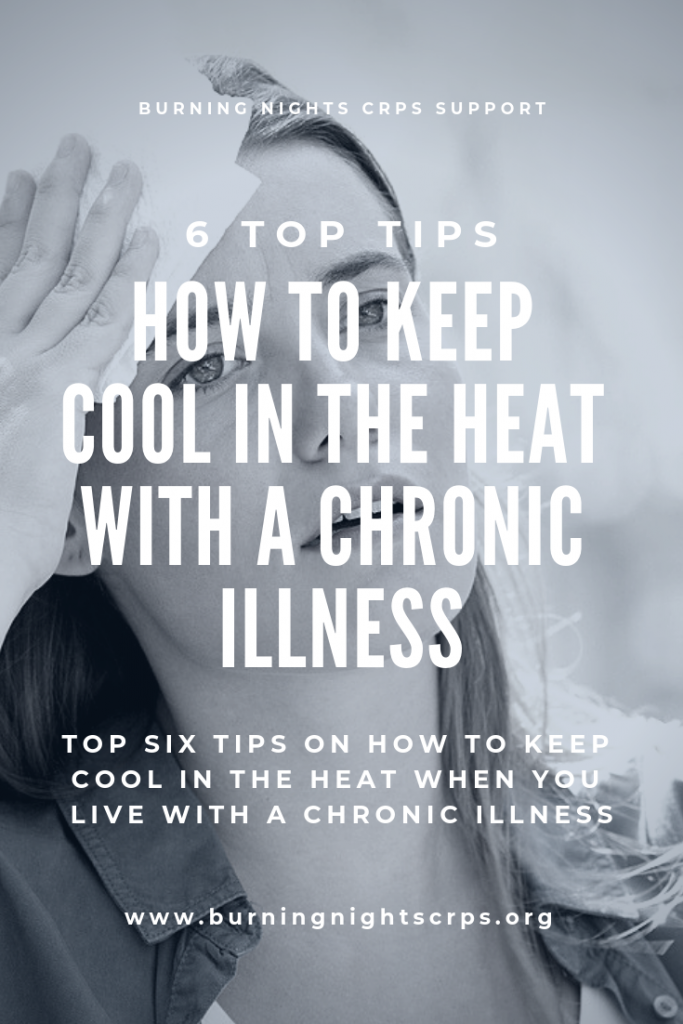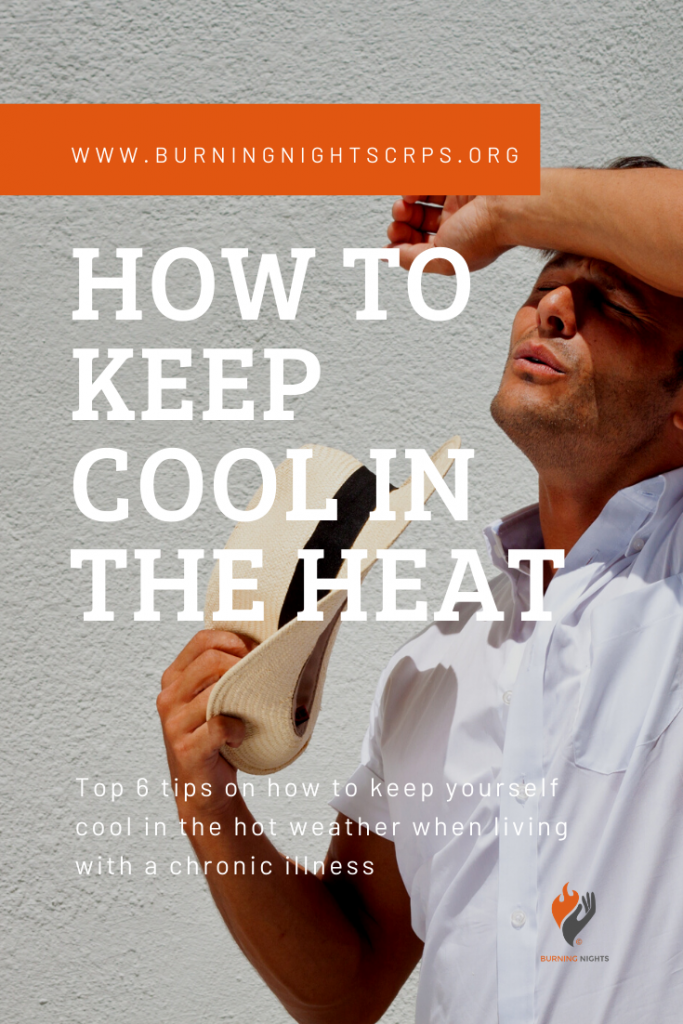Our Top 6 Tips On How To Keep Cool During Hot Weather When You Live With A Chronic Illness.
Learn how to keep yourself cool during the hot weather when you live with a chronic illness such as CRPS, with our top six (6) tips.

Living with a chronic illness like CRPS can often mean you already have issues regulating your body temperature. In hot weather this may cause you even more problems, more pain, more flare ups as well as feeling very uncomfortable.
Hot weather can cause increase of blood pressure, your core body temperature, heat rashes, dizziness, fatigue or can make you feel nauseous. Knowing how to keep yourself cool during hot weather when you have a chronic Illness is important.
Here are our 6 top tips to help you keep cool during hot weather when you live with a chronic illness. These are:
1. Keep Yourself Hydrated
- Keep yourself well hydrated – Keeping yourself as hydrated as possible is crucial. Sweating is a symptom of CRPS as well as many other conditions. However during hot weather you can sweat more, which can remove salt and minerals from your body. Therefore keeping well hydrated and not waiting until your thirsty is important.
- Avoid alcohol and caffeine – Try to avoid alcohol in the hot weather. Alcohol is a diuretic and as such it does interfere with the body’s mechanism to regulate temperature. Caffeine can also promote dehydration in the hot weather.
2. Eat The Right Way
- Eat smaller meals – Try to eat smaller, lighter meals that are easier to metabolise throughout the day, rather than larger meals at the usual meal times.

Check Out Our Top 6 Tips on How To Keep Cool In The Heat Living With A Chronic Illness via Burning Nights CRPS Support
3. Keep Your Body Cool
- Keep your body cool – Use the right products for you to keep yourself cool, which will depend on how your CRPS or your chronic illness affects you. Some chronic illnesses like CRPS can cause skin sensitivities, so knowing what you can use or not use to cool your body down in important.
- Here are some ideas that may help cool your body down: cooling towels, wet pillow cases, hand fan or air conditioning. If you find your body overheating, cool your wrists down under cool running water or in a sink of cold water. Or use cool compresses on your pressure points of the wrists, back of the neck or even around the ankles or feet. Obviously what you use will completely depend on where how your chronic illness affects you. If you suffer with allodynia or hyperalgesia some of these products or options may not be possible.
- Have a cool or lukewarm shower – Have a cool or lukewarm shower to cool your whole body down. If this isn’t possible then use damp face cloth or cool damp pillow case for your body and face. Using mint or menthol products can also help increase the feeling of cool.
- Keep a cool water spray next to you, so you can spray your face when you get hot or if you’re in bed.
- Pace yourself – If you do any activity such as gardening, going to the gym or exercising at home, remember to pace yourself! If you do any activity try to do it in the coolest parts of the day i.e. early morning or in the evening
- Keep out of the direct sun between 10am until 4pm – if you’re outside during hot weather try to keep in the shade. If you do go outside in the sun and heat, don’t forget to either wear a hat or use an umbrella to keep you shaded. Always wear sun cream and also take a bottle of water with you. Unfortunately many chronic conditions and medications can increase your skin’s sensitivity to sunlight. This means you can burn quicker in the direct sun, which can also increase the chance of heat related conditions.

4. Wear The Right Clothing
- Wear lightweight, light in colour, comfortable clothing especially cotton and linen. If you’re outside then wearing light colour clothes can also help keep yourself cool.
5. Keep Your Home Cool
- Keep your home cool – close your curtains or blinds and open your windows to keep your home cool. If you can withstand it, you could turn on the air conditioning or a fan. You can also cool a room down simply by hanging a cool damp sheet in front of an open window? You could also have a tray of ice in front of a fan, point the fan towards the ice. This could allow even cooler air to come into the room. However if you do this, just don’t forget to keep plenty of ice in the freezer!
6. Medication
- Keep your medication cool – check on the medication instructions or on the bottle as to its correct storage temperature. If in doubt speak to your pharmacist or GP (local doctor). Remember not to leave your medication in the car or in the boot of a car. This is because temperatures can get extremely high in closed vehicles.
BONUS TIPS
- Make sure you have sufficient medication to save yourself having to go out in the heat to collect your prescription
- Some medications cause photosensitivity or sun sensitivity. This increased sensitivity to the sun may result in severe sunburn, hives, rashes, and increased risk for skin cancer
- Remember to take plenty of rests
- Don’t forget to wear sunscreen when you’re outside. Although this doesn’t help with temperature it will help with stopping burning unnecessarily
- Remember that you can burn even if it’s cloudy due to the UV rays of the sun. So don’t be fooled by the clouds!

Finally…
Always be on the look out for heat related illness such as overheating, heat exhaustion or heat rashes. Remember that overheating is a serious condition. Finally be aware of the signs of overheating which include:
- dizziness,
- fainting,
- headaches,
- profuse sweating,
- fast heartbeats,
- nausea
- cold/clammy skin with goose bumps
(Patients Engage 2018)
If you experience any of these symptoms, go to a cool/shady place, drink fluids such as water or lemonade, and call your doctor.
Hopefully these 6 top tips on to keep cool during hot weather when have CRPS or chronic illness will help. What are your top tips for keeping cool in the hot weather when you have a chronic illness? Share your tips in the comment section below, or share our tips via the social media buttons.
Check out some of our other chronic illness blogs
Have you read any of our other CRPS and chronic illness blogs? Here’s a few that may interest you:
Cited Research
Written: 17/07/2019
Last Updated: 21/05/2020





 £
£